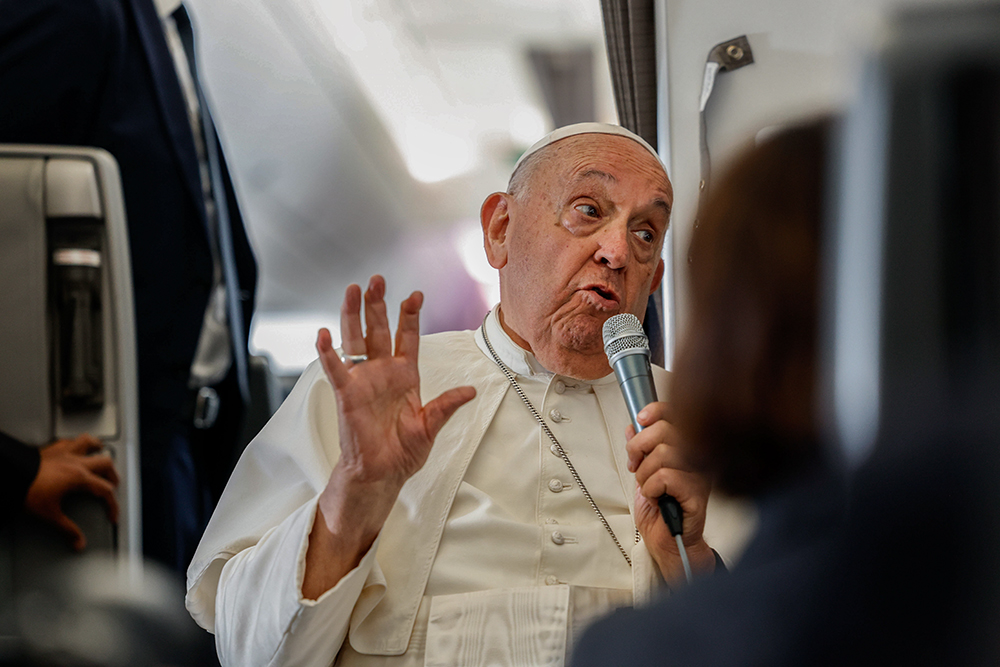Pope Francis should have ducked the question about the US election
“Thank you for the question, but I am the bishop of Rome, not the archbishop of Washington, so I have no comment on the upcoming elections in the United States.” “My job is to confirm the Catholics of the United States in the faith, not in any political decision-making. They can, and must, form their […]



“Thank you for the question, but I am the bishop of Rome, not the archbishop of Washington, so I have no comment on the upcoming elections in the United States.”
“My job is to confirm the Catholics of the United States in the faith, not in any political decision-making. They can, and must, form their own consciences about whom they should be voting for in their elections.”
“You reporters want to get me into trouble. No thank you. Next question.”
“The issues facing the people of the United States are grave and I encourage the Catholics of that great country to search their hearts, do what they can to build a politics that is worthy of the human person, one that leaves no one behind, a politics focused on the common good, with a special concern for the poor. That is the only political guidance offered in the Gospels so it is the only political advice I can offer.”
Any of these answers would have been preferable to what the Holy Father did say during the press conference Sept. 13, on the flight back from Asia.
The pope is known for his spicy way of saying things. And he speaks his mind. There are times, however, when it is better to say nothing than to throw out statements that sound like they were designed to make the headlines. Which they sure did.
The real problem came in the follow-up question from CBS News’ Anna Matranga, who asked, “In your opinion, Your Holiness, are there circumstances in which it is morally permissible to vote for a candidate who is in favor of abortion?”
He replied, “In political morality, it is generally said that not voting is ugly, it’s not good. One must vote. And one must choose the lesser evil. Which is the lesser evil? That lady or that gentleman? I don’t know; each person must think and decide according to their own conscience.”
The phrase “one must choose the lesser evil” misunderstands the choice facing the American people. As Catholics, we believe abortion is a grave evil. No one should be surprised that the pope thinks so. But we are choosing candidates, not issues, when we vote.
Yes, the Catholic Church teaches that abortion is evil, and Vice President Kamala Harris supports abortion rights. She supports legalizing, and government funding for, a grave evil. But she is not evil.
It is difficult on any given day to know what former President Donald Trump does and doesn’t stand for, other than the idea that he should be free to do and say anything he likes with no consequences.
As I have said before, Trump’s political posture is best described as reptilian: Everything is food or threat. There is no coherent governing philosophy. No one can produce evidence he is motivated by any profound vision of the common good.
The Lord Jesus never asked his disciples for help with the awful responsibility of passing judgment on other persons, so none of us should say Trump is evil. What we can say is that he seems to relish the prospect of doing evil things in a way no candidate for the presidency has done in my lifetime.
The pope’s answer to the first question was also problematic. The pope spoke against both abortion and treating migrants badly, which is fine, but his words were unequal to the gravity of the issues.
“Both are against life: the one that throws out migrants and the one that kills children. Both are against life. I can’t decide; I’m not American and won’t go to vote there,” he began, his words almost flippant.
He went on to explain why the church demands migrants and unborn children be treated with the human dignity that is at the heart of the church’s social teaching. But very few headlines got to his explanation about why the church teaches what it teaches.
As my colleague NCR Vatican correspondent Chrstopher White noted in his report, the pope’s comments put him at odds with the U.S. bishops’ conference, which stated that abortion was their “preeminent priority” in this election. But that important note was buried in most of the mainstream coverage. The Associated Press story contrasted the pope’s comments with the U.S. bishops’ stance in the 19th paragraph of its article about the press conference.
I love our pope. I hate having to criticize him. And I am not sure anything he said will make a difference to the election. Still, it would have been better if he had ducked the question.














